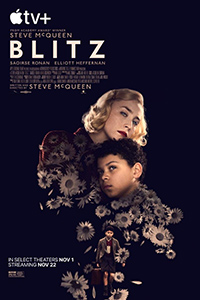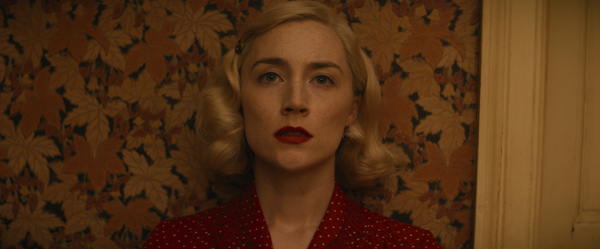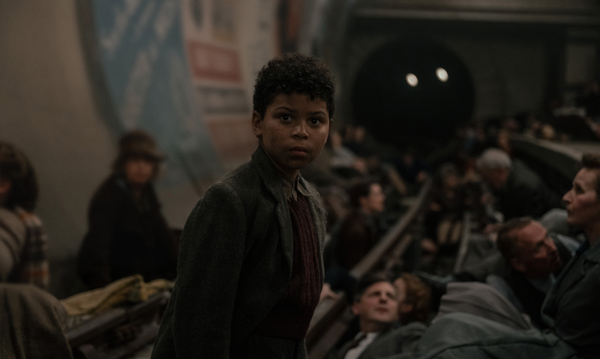London Has Fallen: McQueen Explores Life During Wartime
 Following his extensively researched 2023 documentary Occupied City, which details WWII atrocities waged against the Dutch during Amsterdam’s Nazi occupation, it would seem Steve McQueen has been motivated to continue his exploration of the period with Blitz, reenacting the catastrophic blitzkrieg (aka ‘lightning war) of Britain during the 1940s. While an ensemble cast of characters intertwine in this saga, McQueen focuses on the separation of a mother and her child, each facing their own unique cultural intersections which were difficult even before the onset of the second world war. There are few contemporary examples of films about the London Blitzkrieg, more often than not a backdrop looming over more intimate human struggles, such as Atonement (2007), Their Finest (2016), or even the rehash of Graham Greene’s swooning The End of the Affair (1999). As the title would indicate, McQueen drives this to the foreground which dictates several weeks in the lives of its characters, who become survivors of what feels like a perilous fairy tale.
Following his extensively researched 2023 documentary Occupied City, which details WWII atrocities waged against the Dutch during Amsterdam’s Nazi occupation, it would seem Steve McQueen has been motivated to continue his exploration of the period with Blitz, reenacting the catastrophic blitzkrieg (aka ‘lightning war) of Britain during the 1940s. While an ensemble cast of characters intertwine in this saga, McQueen focuses on the separation of a mother and her child, each facing their own unique cultural intersections which were difficult even before the onset of the second world war. There are few contemporary examples of films about the London Blitzkrieg, more often than not a backdrop looming over more intimate human struggles, such as Atonement (2007), Their Finest (2016), or even the rehash of Graham Greene’s swooning The End of the Affair (1999). As the title would indicate, McQueen drives this to the foreground which dictates several weeks in the lives of its characters, who become survivors of what feels like a perilous fairy tale.

In London, 1940, nine-year-old George (Elliott Heffernan) finds himself unwillingly transported to the countryside along with millions of other British children as the government’s response to keeping them safe from Hitler’s nightly bombing of populated areas. But George’s family is also somewhat unique, which complicates such a separation. Raised by his single mother Rita (Saoirse Ronan) and grandfather (Paul Weller) after his father was deported back to Grenada following a racially motivated altercation with police, George has internalized a self-loathing motivated by the xenophobic climate he’s been raised in despite the love and care of his guardians. Jumping off the train before it reaches George’s final destination, he attempts to make his way back home through the kindness of strangers, while his distraught mother must depend on the assistance of an enamored soldier (Harris Dickinson) to track his whereabouts amid nightly excursions to the safety in the subway.
There’s something quite Dickensian about Blitz, focusing as it does on George, initially lost to the streets like the waifish exploits of Oliver Twist. And yet it’s also a metaphorical journey about identity politics, and George’s experiences allows for a reclamation which, heretofore, had not been allowed space to develop. In many ways, he’s like Pinnocchio, a demeaned persona whose transformative epiphany is the realization of his own worth, something rarely considered in films dealing with war torn sagas mostly fixated on the survival of white, heterosexual men and women (largely because, historically, they’re usually who are writing and directing these reenactments).
McQueen balances his sentimentality with authenticity, as it’s important to read between the lines of what George’s well-intentioned mother and grandfather say and don’t say. It’s clear they’re worried about George being bullied for his ‘differences,’ while Rita consistently engages in positive reinforcement about how beautiful her boy is. Unfortunately, unbeknownst to his white caretakers, this isn’t enough to quell the subconscious conditioning George has already taken to heart, and it allows for McQueen’s most formidable moments when the young boy encounters a positive example of Black representation in Benjamin Clementine’s Ifay, a soldier monitoring the nighttime streets of London.

Ronan is simple but effective as Rita, with McQueen utilizing the performer’s underrated skills as a singer (not unlike Ryan Gosling did in his 2014 debut Lost River), and it’s perhaps even more exceptional as a counterpart to her thornier, agonizing performance as a recovering alcoholic in this year’s The Outrun. What’s curious is how McQueen peppers his supporting cast with a gaggle of recognizable faces, such as Harris Dickinson as a soldier who clearly has eyes for Rita. However, they never run headlong into the kind of Waterloo Bridge scenario McQueen seems to be channeling. The same can be said for musician Paul Weller, whose novelty casting as a kindly grandfather would seem to suggest Claude Berri’s The Two of Us with Michel Simon.
Quite subversively, McQueen casts Mica Ricketts as Jess, a Black woman who initially appears to be a helpmate for George, but is quickly revealed to be an insidious recruiter of children for a band of violent criminals led by Stephen Graham. Amongst their group is a spooky matriarch played by Kathy Burke, who seems to keep these merry band of marauders strangled by the same kind of apron strings Shelley Winters employed in Pete’s Dragon (1977). And while Hans Zimmer supplies a customarily suitable score, it’s cinematographer Yorick Le Saux who (as he’s proved with other Euro auteurs such as Claire Denis, Luca Gaudagnino, and Olivier Assayas) manages to do quite a lot with minimal resources in capturing the day-to-day existence of bombed out Britain.
If Blitz may not stand as McQueen’s most sensational or harrowing reincarnation, it arguably balances the director’s usual penchant for miserabilism and sentimentality. Its heroes and villains are less drastically defined, as compared to his Academy Award Winning onslaught 12 Years a Slave (2013). And despite extreme and desperate circumstances, there’s a hopefulness which beats constant, unlike the futility shackling Michael Fassbender in his early works, such as Hunger (2008) or Shame (2011). Rather, McQueen returns to the vibrant resiliency evidenced in moments of his Small Axe (2020) series, particularly Lovers Rock and Education, where terror and tenderness intermingle.
★★★★/☆☆☆☆☆


